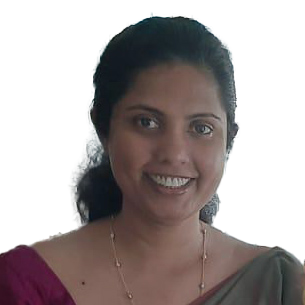Dr Saumya Darshani Guruge, a specialty registrar in geriatric medicine, joined the NHS in December 2022 as part of her postgraduate medical training from Sri Lanka. Over the course of 2 years, she worked at University Hospital Lewisham (UHL) and Hereford County Hospital (HCH) under the Medical Training Initiative (MTI) Programme, gaining invaluable experience in geriatric care within the UK healthcare system.
In this piece – part of our #NextGenPhysicians blog series – Saumya reflects on the challenges, lessons and inspirations from her time in the NHS, and how they will shape her future contributions to geriatric medicine in Sri Lanka.
My time working at the NHS was a challenging yet fascinating and memorable 2-year journey. I came to the UK from Sri Lanka in December 2022 as part of my local postgraduate medical training, which required overseas experience in my field of specialisation. During the first year, I was based at UHL, part of the Lewisham and Greenwich Trust. For the second year, I opted to work outside of London at HCH, under the Wye Valley NHS Trust. I'm truly grateful to the MTI Programme.
Starting a senior position at the NHS was no easy feat. Even though I felt highly confident in my clinical expertise, skills and positive mindset, the actual execution was vastly different from the medical practices I was used to in Sri Lanka. It was a drastic transition, going from a paper-based system to a fully computerised one. Although I eventually mastered the electronic patient records and e-prescribing, I have to admit that I only learned a super simple way to transfer GP details into clinical notes just a few days before my last day at the NHS – which was a bit embarrassing. But every day was a learning experience for me. Luckily, all my colleagues were incredibly supportive and understanding, and I was able to get up to speed within the first few weeks, reaching the expected level of functioning as a senior team member.
As a geriatric specialist, I was familiar with the concept of interdisciplinary, patient-centered care. However, in my part of the world, the ideal multidisciplinary team approach – where different professionals come together to assess, discuss, and devise a management plan for the patient – was not the norm. Instead, the doctor would identify the problem and, if needed, refer the patient to relevant allied health professionals like physiotherapists, occupational therapists, or speech and language therapists to assist in their care. Putting the true interdisciplinary model into practice was really satisfying, and I couldn't help but admire how fortunate the people in the UK are to have such a wonderful service provided by the NHS. At the same time, I was already planning how I could apply and improve similar geriatric services in my own country after returning from my training.
Sending a patient home after treatment was much harder than I ever imagined. Back in Sri Lanka, if a patient was medically ready to leave, we could just discharge them quickly – it is rare to meet patients living alone or being homeless, since most of the time they had family members to pick them up from the hospital. So discharge coordinators, community hospitals, assessment beds, and care packages were all totally new concepts to me. But when I was at Lewisham, one of the consultants was kind and understanding, and took the time to walk me through all that confusing vocabulary and explain the complexities of discharging a patient from the hospital. That initial lesson from an experienced senior consultant really helped me to understand the options available when making management decisions at a senior level.
With time, I realised that the vocabulary and functioning of different NHS trusts can vary. For example, at the first hospital I worked at, patients over 75 were considered for the 'care of elderly: aka COE' unit, while at Hereford County Hospital, the age cutoff was 65 for the 'frailty' unit. Also, at UHL the stroke unit was run by geriatricians, but at HCH there was a separate stroke physician. And at Lewisham, there were hardly any options to discharge patients to community hospitals, unlike Hereford which had plenty. What I learned was that the care model needs to fit the local community, not a one-size-fits-all approach. The diverse perspectives I encountered were a big help in understanding things, especially since geriatric medicine is a new field in Sri Lanka and I'm one of the first two trainees from the island. Seeing these different models in the UK will help me figure out what works best for our community back home.
During my 2-year stint, another key thing I learned was the importance of soft skills, not just for being a good doctor, but also for adapting to a foreign environment. Thanks to my upbringing and what I picked up from my family, teachers and friends, I was able to interact with patients quite well, even though the cultural and language differences could be challenging at times. Overall, I don't think I did too badly in this regard. Another thing that really helped me adjust so easily was how helpful and inclusive the people in the NHS and the UK in general were. I was sometimes amazed at how welcoming they were to the diversity they encountered. On top of that, I got an invaluable opportunity to participate in soft skills simulation training during my second year at HCH, which was quite insightful.
When I was at the NHS, I had plenty of opportunities to attend valuable virtual conferences organised by the Royal College of Physicians and the British Geriatrics Society. My study leave and budget were mostly covered, for which I'm really grateful to the MTI Programme and the NHS. I'm also thrilled to share that I passed the MRCP SCE in geriatric medicine and the MRCP PACES on my first try, all thanks to the great teachers and medical education system back in Sri Lanka that gave me a solid foundation, which then further enhanced by my time at the NHS. I'm deeply grateful to all the patients in both countries who helped me develop my knowledge and skills.
Looking back, my whole journey in the NHS was really rewarding and I'm excited about how it'll shape my career and personal life. I'm committed to providing top-notch care back home while also helping to improve the healthcare system there with the lesson learnt in the NHS, for which I am ever so grateful.
This piece is part of the RCP's #NextGenPhysicians series of guest blog posts. If you are an early career doctor with a story you’d like to tell, please contact hannah.perlin@rcp.ac.uk.






